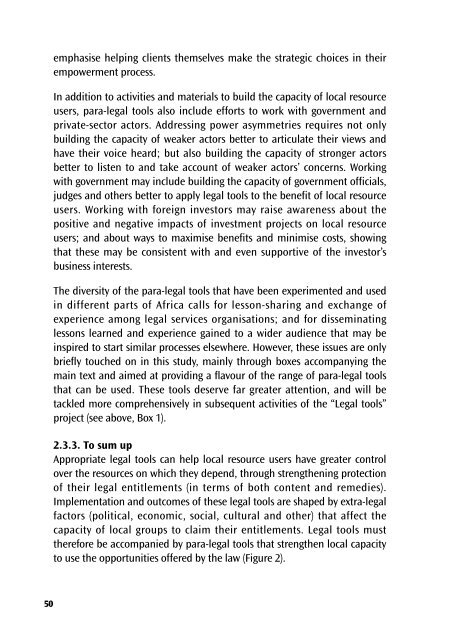Legal empowerment for local resource control
Legal empowerment for local resource control
Legal empowerment for local resource control
You also want an ePaper? Increase the reach of your titles
YUMPU automatically turns print PDFs into web optimized ePapers that Google loves.
50<br />
emphasise helping clients themselves make the strategic choices in their<br />
<strong>empowerment</strong> process.<br />
In addition to activities and materials to build the capacity of <strong>local</strong> <strong>resource</strong><br />
users, para-legal tools also include ef<strong>for</strong>ts to work with government and<br />
private-sector actors. Addressing power asymmetries requires not only<br />
building the capacity of weaker actors better to articulate their views and<br />
have their voice heard; but also building the capacity of stronger actors<br />
better to listen to and take account of weaker actors’ concerns. Working<br />
with government may include building the capacity of government officials,<br />
judges and others better to apply legal tools to the benefit of <strong>local</strong> <strong>resource</strong><br />
users. Working with <strong>for</strong>eign investors may raise awareness about the<br />
positive and negative impacts of investment projects on <strong>local</strong> <strong>resource</strong><br />
users; and about ways to maximise benefits and minimise costs, showing<br />
that these may be consistent with and even supportive of the investor’s<br />
business interests.<br />
The diversity of the para-legal tools that have been experimented and used<br />
in different parts of Africa calls <strong>for</strong> lesson-sharing and exchange of<br />
experience among legal services organisations; and <strong>for</strong> disseminating<br />
lessons learned and experience gained to a wider audience that may be<br />
inspired to start similar processes elsewhere. However, these issues are only<br />
briefly touched on in this study, mainly through boxes accompanying the<br />
main text and aimed at providing a flavour of the range of para-legal tools<br />
that can be used. These tools deserve far greater attention, and will be<br />
tackled more comprehensively in subsequent activities of the “<strong>Legal</strong> tools”<br />
project (see above, Box 1).<br />
2.3.3. To sum up<br />
Appropriate legal tools can help <strong>local</strong> <strong>resource</strong> users have greater <strong>control</strong><br />
over the <strong>resource</strong>s on which they depend, through strengthening protection<br />
of their legal entitlements (in terms of both content and remedies).<br />
Implementation and outcomes of these legal tools are shaped by extra-legal<br />
factors (political, economic, social, cultural and other) that affect the<br />
capacity of <strong>local</strong> groups to claim their entitlements. <strong>Legal</strong> tools must<br />
there<strong>for</strong>e be accompanied by para-legal tools that strengthen <strong>local</strong> capacity<br />
to use the opportunities offered by the law (Figure 2).

















